Terms and Conditions —
Trigger warning: Discussion of the definition of dieting, plus dieting research.
Although Word-lovin’ Wednesdays are reserved for book reviews, what I’m about to share is semantic in nature, so the theme fits.
There have been a few comments this week that have spoken to a legitimate grey area in the definition of dieting. In Monday’s post, I shared some examples of Weight Watchers’ clients who recognize International No Diet Day, but claim they’re exempt since WW isn’t a diet. Ask any mainstream commercial weight loss program and they will vehemently deny that they are a diet by claiming that diets are temporary and that their program is a permanent “lifestyle change.”
“See,” they smile, “that’s why diets fail. It’s not that weight loss is nearly impossible. It’s that when you’re on a diet, the weight loss behaviors are temporary. Our program is a permanent change and therefore not a diet.”
Next time you hear somebody say that, you have my permission to look them straight in the eye and say “Bullshit.”
The research on weight loss failure is not limited to short-term programs. The failure is equally dismal for programs that include a maintenance phase.
In 2006, the New England Journal of Medicine published the results of a study which sought to determine the success of long-term maintenance programs for people who lose more than 10% of their starting weight, already an outlier group, considering the sparse number of people who surpass the 10% mark:
We report here the results of the Study to Prevent Regain (STOP Regain), a randomized clinical trial testing the efficacy of a face-to-face program and an Internet-based program, as compared with a newsletter control group, in preventing weight regain over a period of 18 months.
Of the 315 participants, subjects were divided into those who lost 10-20% of starting body weight and those who lost over 20%. Subjects were then randomized into either the face-to-face, internet or control group. After 18 months, the study had an impressive retention rate of 92.7%.
Now, a few details that you need to know: at the start of the study, which was after they had lost the weight, subjects weighed an average of 170 pounds and had been dieting for an average of 13 months. On these prior diets, subjects had lost between 41 and 44 pounds on a 1,600 calorie diet. You can view the precise baseline characteristics here.
After 18 months of the weight maintenance program, the results are clear:
The mean (±SD) absolute weight gain over the 18-month period was 2.5±6.7 kg [5.5±14.8 pounds] in the face-to-face group as compared with 4.7±8.6 kg [10.4±19 pounds] in the Internet group and 4.9±6.5 kg [10.8±14.3 pounds] in the control group
A second study in the February 2011 International Journal of Obesity followed 338 overweight women through both a six month weight loss phase and an additional 12 month maintenance phase. So, as opposed to the previous trial which only looked at the most successful dieters, this program had observations reflective of a typical weight loss program.
After six months, subjects lost an average of around 17 pounds. Subjects were then divided into a motivation-focused maintenance program or a skill-based maintenance program.
One year after losing that 17 pounds, and 18 months into investing in this latest weight loss attempt, subjects had already regained over 5 pounds.
And the further you get from achieving your goal weight, the more weight you are likely to regain.
So while weight maintenance programs may slow down the weight regain phase of the cycle, subjects gradually regain the weight anyway. I have not found any studies that track a weight maintenance program for five years and I’ll bet I never will.
The reason is that the biological principles that govern weight regulation don’t give a shit if you join a maintenance program because your body will still fight to reestablish its baseline characteristics.
Which brings me to the point at hand: what is dieting?
Is a diet just a fad program meant to create short-term weight loss without the long-term commitment? Is a diet a six-month program that ends abruptly and throws you into the world of hotdogs and cheesecake and imminent failure? Or is a diet any program that promises to make you thin with their unique dietary prescription?
In a recent, unpublished interview I did with Dr. Glenn Gaesser, author of Big Fat Lies, I presented the following as a definition of dieting, which he agreed with: dieting is the use of caloric manipulation in an attempt to lose, or maintain, a certain amount of weight.
It’s as simple as that.
So, when Rapunzel admits to being “of those shake people” does that mean she’s on a diet? It depends on whether she’s doing it for her health or her weight. If her doctor prescribes SlimFast as a treatment for insulin resistance, then it’s not a diet, but if she’s doing it to lose weight, then it is.
When elengendros says that he/she watches what he/she eats to keep her weight below a certain level, then elengendros is on a diet. Elengendros went on to express doubt that there’s a difference between eating a healthy diet for health and eating the same healthy diet to lose weight.
The difference isn’t what food you eat, what caloric level you’re at or what macronutrients you avoid. The difference is in your mindset when eating these foods.
Are you going vegetarian because you want to be healthier and you believe a vegetarian diet is the healthiest way to live? It’s not a diet.
Are you going vegetarian because you believe the Asshole Animal Brigade (aka PETA) when they say it will make you thin? It’s a diet.
International No Diet Day isn’t about shunning healthy foods and exercise. It’s about casting off the belief that engaging in healthy behaviors will transform your body into the ideal, as well as rejecting the corollary belief that if you don’t lose weight while eating healthy, then you must have failed personally.
So, it doesn’t matter how long your “lifestyle change” lasts. If you’re only changing your habits because you think it will tip the caloric balance in favor of weight loss, then you’re on a diet.
Period.





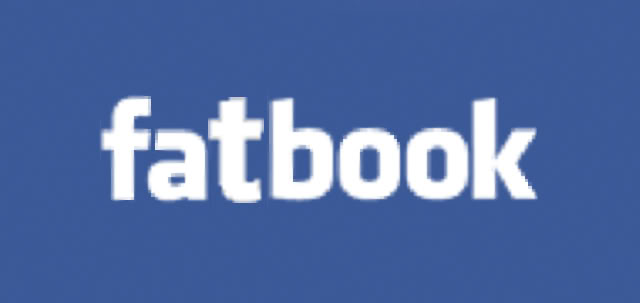


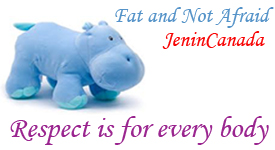

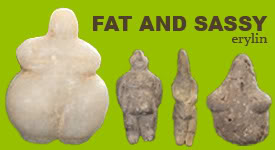
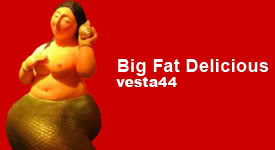

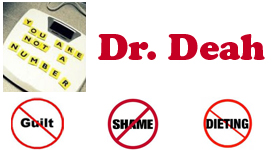


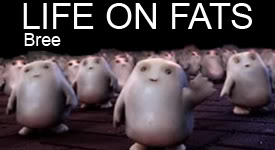



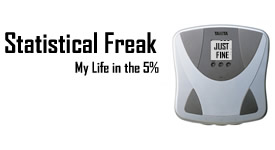


I have always thought of two ways you can use the word diet. 1)”I am on a diet” and 2) “I have a good diet.” Both statements mean different things. I have always thought of “dieting” in the “I am on a diet” way as eating in a way that is based on deprivation of the basic proper nutrients your body needs daily. So by that, even if someone cuts down on calories, sugars, or fats (assuming they were consuming those in excess) but they are still getting the nutrients and vitamins they need, I wouldn’t call that a diet, just eating healthily and being mindful of their daily intake.
So by my idea of what defines a diet, WW may or may not be considered a diet. I don’t know the details of the program, but if it isn’t based on deprivation, I have a hard time calling it a diet.
Ashley,
The problem with Weight Watchers and the rest is that if you tell them “I want to lose 100 pounds” they will provide you a plan that will allegedly help you meet that goal. Whether a healthy diet causes weight loss is beside the point. What matters is that you have a specific weight loss goal or dress size or body shape in mind when you undertake the program.
WW is based on deprivation, even though the Points Program is supposed to give you the “freedom” to eat what you want. There are still limits set on foods, which are ultimately meant to push your caloric intake downward. So, Weight Watchers uses caloric manipulation through their unique Points program in the pursuit of weight loss.
I think the “I have a healthy diet” version is devoid of any weight loss ambition. The benefit of eating healthy is that you may improve your health. But the minute you see healthy eating as a program for achieving weight loss, you have gone on a diet diet.
Peace,
Shannon
I see what you are saying. I try not to judge what people want to put their bodies through, but I think there are certain bits and pieces of certain diet programs that have the right ideas towards eating healthier, but that mixed with the promise to lose weight and the fact that they do it for profit is what I take issue with.They shouldn’t need to stay on a program where they pay money. I also take issue with the fact that our society is so weight focused and not health focused. I wish everyone could just relax about weight and start focusing on how to eat healthily.
Just to clarify, I don’t judge people for going on Weight Watchers. It’s simply a result of our culture that makes weight loss both a moral and ethical obligation, particularly for women. I don’t blame, or judge, people who succumb to that pressure in the least.
I reserve my judgement for the slugs and cretins who profit off of that moral and ethical obligation with products that do not deliver the results they promise, ESPECIALLY when they have reams of research that tells them Jennifer Hudson is a freakish outlier.
And, yeah, Weight Watchers has co-opted nutritionally sound advice (whole grains are healthier than highly processed grains, lean meats are healthier than fatty meats), but teaching people that healthy eating leads to significant, long-term weight loss is simply not substantiated by the evidence. Capitalizing on the assumption that it does is immoral and unethical, and that’s what I fight against.
Peace,
Shannon
Well said. Like I said in my book, Food isnt the cause of obesity therefore food isnt the answer.
I actually went to that doctor to lose weight-not to work on my insulin. Because that’s what his practice is all about. It’s a weightloss clinic, not a diabetes management center. But the basis of his practice is that most (if not all) of his patients suffer from some amount of insulin resistance (I had no clue about this stuff before). I think it’s vastly widespread but maybe not everyone knows it? I don’t know.
But I do know that I was put on a diet where weight loss as the focal point. Not only was I put on low-carb shakes (which slimfast is not, by the way) for breakfast, but I was only allowed between 1000-1200 calories per day. It wasn’t all about working on preventing insulin spikes-it was about caloric restriction too.
Which is why I think it’s just too much for me all at once. Because not only are they taking away the one type of food that I love and crave-flour (I’m a bread baker)-but you’re taking away calories too. What do you eat when you can’t eat carbs? Meat and cheese, of course. My doctor stressed protein and meat more than anything else (except maybe water). But unlike the Atkin’s diet, you’re limited with your meat and cheese and how you eat them because of the calorie limit. Meat and cheese (besides skim mozz I suppose) is usually quite high in calories when you divided into only 1000 calories per day. And nuts are also high in calories as well. It made me feel backed up against a wall trying to do the math and figure out what I could and couldn’t “afford.” It’s maddening!
I think I just feel overwhelmed with my diet. I would rather start working on cutting down carbs to help insulin resistance at first, and then lower calories if I have to. Going from an assumed 2,000 calorie diet to a 1000 calorie diet without carbs, to me, is down right harsh. I’ve never been the type of person to eat donuts and potato chips-I don’t keep that stuff in the house and I never have-but it was my fresh baked bread that was the culprit, and potatoes at dinner time. I love potatoes and my husband is a total meat-and-potatoes dude.
It’s frustrating because I don’t know how to feel about it. I suppose I appreciate knowing why weight is so hard to lose (and manage) because it’s linked to insulin. I did really well for the firs three months with this diet but then I leveled off because I’m just sick of the restriction. It’s had massive negative effects on me mentally and emotionally-the typical dieting problems like obsessing about food constantly, the horrible guilt, and the frustration because sometimes I can’t find something I *want* to eat that I’m *allowed* to eat, so I just eat nothing instead. Then I overdo it the next day on everything. I always feel like I’m struggling and I don’t like feeling that way 24/7, you know?
I’m thinking I need to focus on a healthier lifestyle than what this diet has done for me. I’ve lost weight and my blood work looks better, but where do you draw the line between physical health and mental health? I’ve been so desperately depressed since I started the diet and it’s driving me insane!
One good thing that came out of this experience is that I have the knowledge and tools that I didn’t before. I learned that even if you eat a lot of carbs later in the day, that no carbs at breakfast is the #1 important rule that still counts. Stick with that rule and not paying so close attention to the numbers of grams of carbs and calories throughout the day seems to keep my weight stabilized (more or less). I have some hard thinking and deciding to do!
Sorry for the lecture!